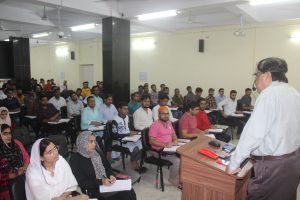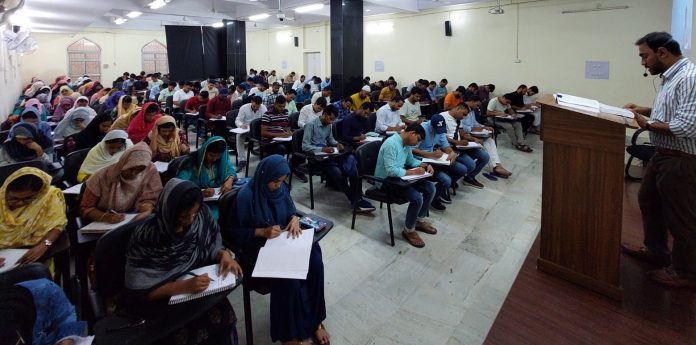– Md Sami Ahmad

The Government of Bihar’s coaching scheme for minority job seekers is yielding good results but the expansion is not on desired lines. A directorate was expected to be fully functional but that is still in infancy. A counselling, training and placement cell was also proposed but it is yet to take shape.
The Government of Bihar’s coaching scheme for minority job aspirants is yielding good results, although it is desired that this should be expanded to districts like Kishanganj and Gaya. Currently, it is mostly centred at the state capital Patna with one exception at Darbhanga.
This scheme was started in 2006-07 with the aim to increase the representation of minority students in government jobs like the civil services conducted by the Bihar Public Service Commission (BPSC) for posts like DSP, BDO and CO, and in other technical and professional competitive examinations like management and teaching.
Earlier it was known mainly for the BPSC civil services examination preparation but later it included competitive examinations for jobs in Railways, Banks and Police. It also provides coaching for qualifying examinations like UGC, NET, CTET and BTET. Recently judicial service has also been included in this scheme.
The state minority welfare department runs these coaching centres mainly at the Haj Bhavan Complex, Patna. Maulana Mazharul Haque Arabic-Persian University, Patna, the nodal agency for this scheme, L.N. Mishra Institute of Economic Development and Social Change, Patna, and a couple of colleges also serve as the coaching centres for this purpose.
The number of candidates for the combined examination of BPSC has now increased to 150 from the starting 50. An entrance test is held for admission to this scheme. The coaching is provided for the PT, Main and Interview. The success rate for this course is around 40 to 50 per cent. For example, in 2020-21 there were 51 successful candidates out of 100 students coached for the interview round of the 64th BPSC combined examination. For the 65th BPSC interview, 24 out of 57 candidates were declared successful. Twelve candidates were successful out of 33 trained in mock interviews for the judicial services in 2021-22.
The report card issued by the Minority Welfare Department gives year-wise data of admitted and successful candidates for different competitive examinations though some data is missing in the column of successful. According to the report card, 1,517 candidates out of 4,777 who were provided coaching were selected for jobs till 2019. The number of total candidates who were enrolled for coaching till 2022 was around seven thousand though the aggregate of successful candidates is not available.
Under this scheme, a committee works to approve the programme for the coaching. It is required to conduct a meeting every six months and as required. This is a nine-member committee headed by the Secretary of the Minority Welfare Department. This committee includes Registrar of the nodal agency, M.M.H. Arabic and Persian University. This committee reviews the expected expenditure and the coaching programme’s achievement.
The coaching scheme has some written guidelines too. The guideline says that the minority welfare department will provide a monetary budget to the nodal agency. There shall be monitoring of the scheme from time to time by departmental official or non-governmental agency. The department will get an evaluation done by a reputed institution.
A directorate under this nodal agency was proposed with at least three cells viz. Coaching Programme Cell, Monitoring Cell and Counselling, Training and Placement Cell.
The Coaching Programme Cell has been assigned to prepare the coaching programme, framing rules and regulations, prepare project/module, prepare course material and selection of coaching institute, financing and audit maintenance.
Mohammad Rashid Hussain, coordinator of this coaching and guidance cell, is a postgraduate in Persian and Central Asian Studies from JNU, and also studied in Hamdard Study Circle. He says he has adopted the model from Hamdard Study Circle. The 24-hour open library, test series, lectures by top experts and online-offline study materials are appreciated by the candidates. The system of group study is also considered helpful.
The mock interview preparation at the Centre is very successful and non-minority students also benefit from here. Girl candidates get maximum safety measures at the Centre. They are provided separate rooms, mess and prayer hall.
There is a demand to expand this scheme and take this to district and block levels. Many successful candidates suggested that more efforts are needed and such initiatives should start at the village level in the state.
Talking to Radiance, Director, Minority Welfare Department A.A.A. Faizi said the expansion programme is being planned. He said searching for quality educators/ faculty members, especially in districts is a big problem. “So, it is being planned to provide online coaching to all the minority hostel students who are eligible for competitive examinations,” informed Mr. Faizi.
It is important to note that two out of the three proposed cells are still not in proper shape.
In-charge Director of the proposed directorate, Inam Zafar said that directorate is not working in its complete form and Vice Chancellor Mohammad Alamgir of M.M.H. Arabic and Persian University is trying to form a fully functional directorate.
Similarly, the counselling, training and placement cell is also not in place. Mr. Zafar said that once a full-strength cell is formed, this cell will start.




